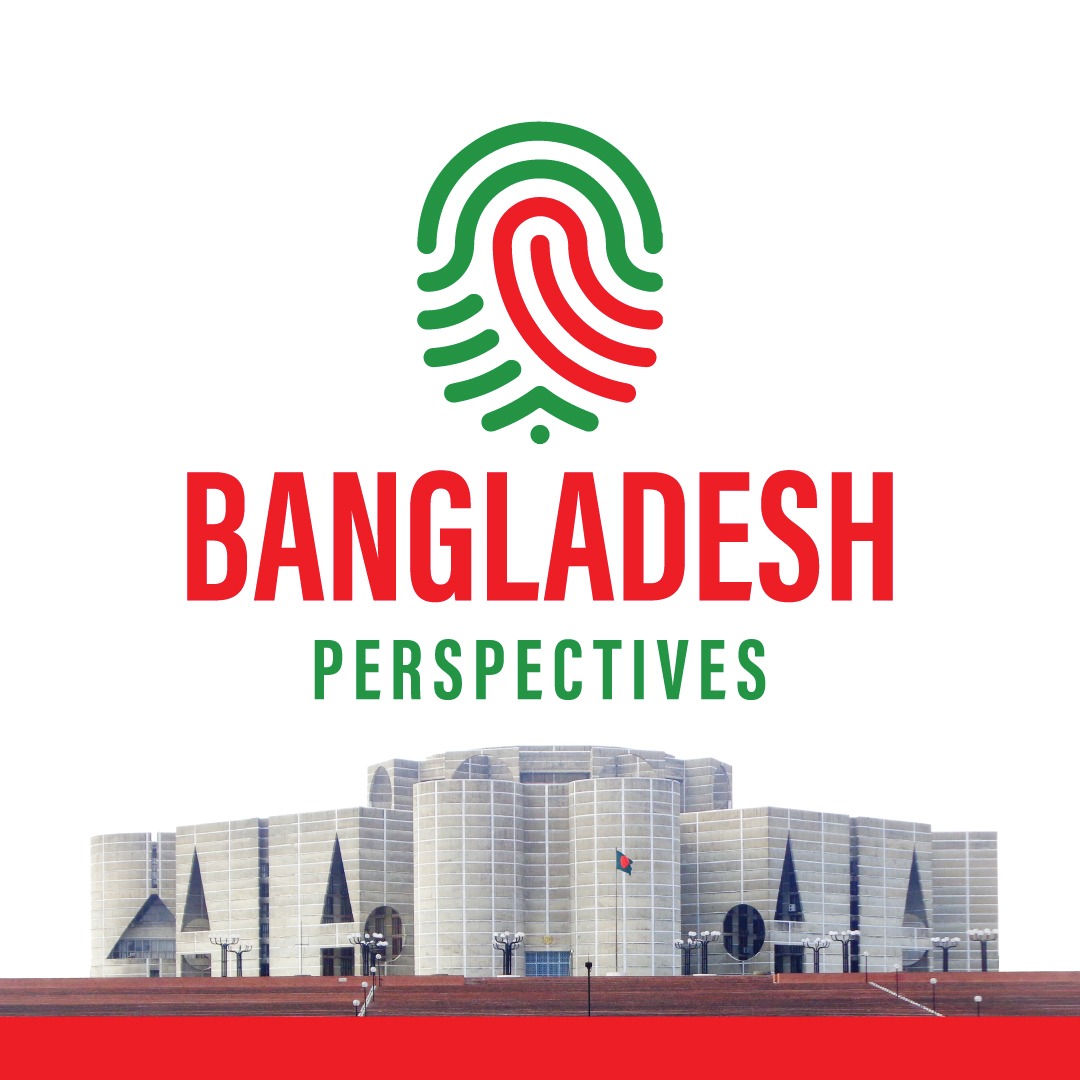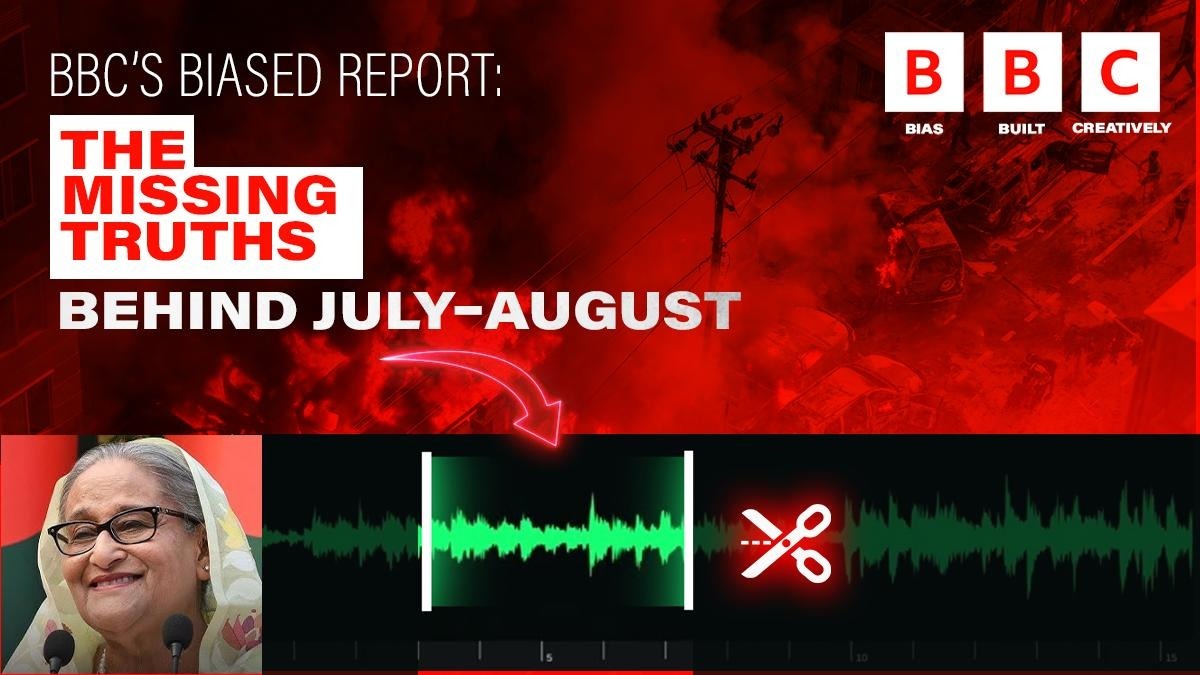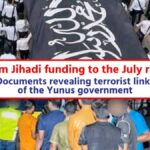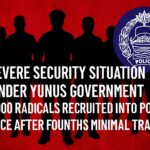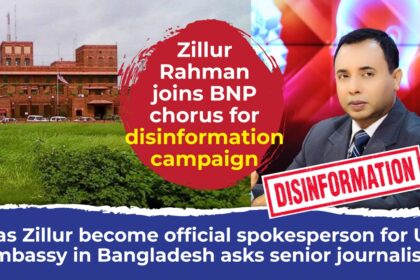BBC Bangla published a report about the clashes and attack on the Jatrabari police station which took place on August 5, 2024, after Prime Minister Sheikh Hasina left the country, The report emphasized how “helpless, innocent, and peaceful” protesters were shot at, resulting in 52 deaths.
However, the report did not mention that before August 5, in this very Jatrabari area, an off-duty police officer was dragged off his motorcycle, beaten to death, and hung from an overpass. Nor did it mention the nationwide attacks on police officers and stations that took place before the 5th.
On July 20, a tourist police officer named Moktadir was beaten to death and hung from the Rayarbagh foot overbridge in Jatrabari while attackers celebrated. Can BBC journalists investigate whether tourist police even carry firearms or are allowed to open fire?
Similarly, on August 4, protesters attacked the Enayetpur police station in Sirajganj, killing 13 police officers. Perhaps BBC can investigate how many protesters died on the spot that day.
Such attacks on law enforcement were widespread across the country. Yet, none of these incidents — these attacks on police — found a place in the BBC report. When “investigative reporting” is dictated by the attackers themselves, a one-sided story is exactly what we get.
On August 6, 2024, the Bangladesh Police Association announced that 450 police stations had been attacked nationwide. If any country’s police forces faced such attacks, even in the UK, what measures would they take? BBC seems to imagine they would stand by with flowers and serve fruit platters to the attackers.
According to a Prothom Alo report on July 23, within just a week from July 16, 113 arson incidents severely damaged police stations nationwide. Protesters also set fire to other government installations including Rampura TV building, Setu Bhaban, and Disaster Management buildings. Perhaps BBC Bangla can investigate how other governments would react to such attacks.
A Facebook status by Mahfuz Alam, a former special assistant to the Chief Adviser and described as the ‘Mastermind behind July Uprising’ by Dr Yunus, revealed that everything from June 1 to July 18 was part of a plan. So were the attacks on critical government infrastructure also part of this plan?
Former movement coordinator Hasib Al Islam said on TV that without setting fires to metro trains and killing police, the movement would not have intensified or succeeded.
Asif Mahmud, current adviser to the interim government on Local Government and Youth & Sports, stated that if the movement had lasted longer, they were prepared for an armed struggle. We believe BBC can investigate the source of those arms.
Moreover, after these attacks, fire service members and their vehicles also came under attack while trying to extinguish fires. Did the fire service shoot anyone?
The central point of BBC’s report is a phone call in which Sheikh Hasina is heard allegedly instructing someone to use “lethal weapons.” BBC claims their source said it’s a conversation from July 18. But there is no evidence provided to verify whether this source is telling the truth.
BBC also claims that the authenticity of the call was confirmed by government intelligence agencies. But after the fall of Hasina’s government on August 5, there were massive reshuffles in all government agencies, including intelligence. Many of those now in charge had previously been punished during Hasina’s tenure for links with BNP-Jamaat terrorists, corruption, and misconduct. Can BBC really trust these agencies now?
BBC also could not prove who was being instructed in this call. If it’s a real call, there should be a full recording. Partial recordings are obvious when a call is intercepted midway. BBC Bangla, we hope, will investigate to find out who received the instructions.
BBC further claims that an organization called Earshot verified the audio, stating it’s “unlikely to be edited,” but they didn’t say it’s impossible.
Interestingly, with today’s deepfake AI technology, one can sample voices and facial features to make entire movies. Sampling Hasina’s voice and adding suitable background noise is not particularly difficult.
On July 19, 2024, protesters attacked Narsingdi Jail, freeing 826 prisoners, including 9 militants. Where these militants went until August 5, whether they joined the protests, and why protesters attacked prisons — we haven’t seen any BBC report investigating these.
However, Hizb ut-Tahrir and Pakistan’s Lashkar-e-Taiba have openly admitted their involvement in this movement. People can consider whether these groups took part in the sabotage, and BBC can also choose to investigate.
If such terrorists escape, loot weapons, and attack government installations and law enforcement, what instructions should a country’s prime minister give to suppress them? We would like to hear BBC’s answer to that.
